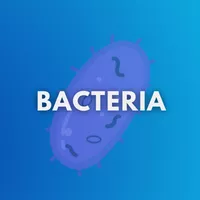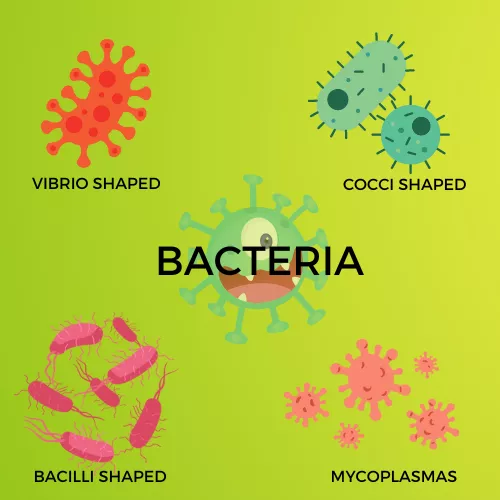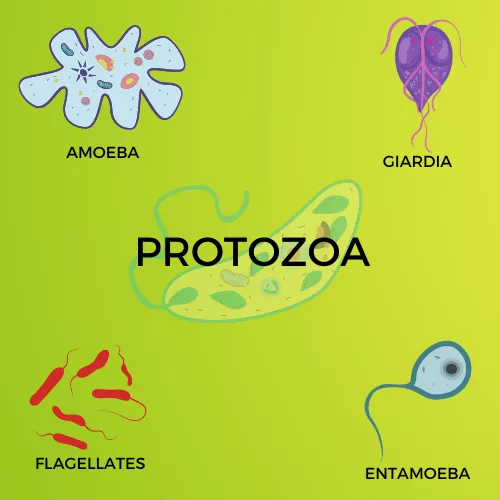Key Difference: Both these words come under the same microorganisms and have the same characteristics: Bacteria and Parasite. Both of these microorganisms will help in improving ecosystems and are harmful too. Bacteria are prokaryotic whereas protozoa are eukaryotic microorganisms. Bacteria have flagella to move and protozoa are less movement than bacteria. Bacteria adapt in all environments, whereas protozoa mostly live in aquatic ecosystems. You can learn the significant differences between bacteria and protozoa in this article.
Good Examples of the words “Bacteria and Protozoa” are,
1. Bacteria do not have a nucleus.
2. Protozoa are generally motile in nature.
BACTERIA

Bacteria are prokaryotic organisms.
Bacteria are microscopic, single-celled organisms with no nucleus and no organelles. Some bacteria are harmful and produce toxins; toxic chemicals affect them, and some are harmless. It is a prokaryotic and single cell’s organism. Humans have long used bacteria to create food products such as cheese, yoghurt, and pickles. Most of the bacteria are fast-growing and are first called animalcules.
There are two types of bacteria, one is Gram-positive, and the other one is Gram-negative. The major difference in both types is gram-negative bacteria have an outer membrane in their body. The world’s first bacteria are cyanobacteria. Bacteria are the smallest living organism on this planet. The main characteristic of bacteria is it doesn’t have membrane-bound organelles in its body. The Best Example of Bacteria is “Bacteria lives in pH neutral.”
How do We Spell the Word Bacteria?
The vocal representation of the word Bacteria is “bak·teeuh·ree·uh,“ and in the below, you can know by hearing the audio of the phrase bacteria.
Enunciation:
Syllabification is where we split the words into individual vowel sounds. A syllable should have at least one vowel in the word. For example, we will see the syllable of the word “Bacteria.”
- I wondered if the word “Bacteria” has four syllables.
- The split is “BAC-TE-RI-A.”
How do We Pronounce “Bacteria”
Using “Bacteria” in sentences:
- Bacteria are disease-causing microorganisms.
- We need to wash our hands using soap to kill bacteria.
- Leeuwenhoek is the father of bacteria.
- How are the bacteria spreading?
- The size of the bacteria is 0.4–3 µm3.
PROTOZOA

Protozoa is a unicellular microorganisms.
Protozoa is a diverse group of single-celled microorganisms that are found in aquatic and terrestrial environments. It plays an important part in the microbial ecosystem and plays roles in ecological processes such as predation and parasitism. It involves both beneficial and harmful, which is important in medical research and for studying cellular processes and disease mechanisms. The Best example of the word “Protozoa” is “There are different 1000 species in protozoa.”
How do We Spell the Word Protozoa?
Spell / Pronunciation in which a word or particular language is spoken among people. The Oral representation of the phrase protozoa is “proh·tuh·zoh·uh.” It would help if you practiced it slowly for the outcome of a perfect spell. Below, you can know by hearing the audio of the word protozoa.
Enunciation:
Syllabification is where we split the words into individual vowel sounds. A syllable should have at least one vowel in the word. For example, we will see the syllable of the word “Protozoa.”
- Wondering if the word “Protozoa” has four syllables in it.
- The split is “PRO-TO-ZO-A.”
How do We Pronounce “Protozoa”
Using “Protozoa” in sentences:
- Protozoa usually harm their hosts.
- Some protozoans cause serious diseases in humans.
- Thirsty is one of the symptoms of the protozoan disease.
- Protozoa are not visible to the naked eye.
- Protozoans are larger than bacteria and viruses.
Similarities between Bacteria & Protozoa
The title reveals the difference between Bacteria & Protozoa. But, like, you want to know also similar things about the above two words. So come, let’s see below.
- Bacteria and Protozoa are microscopic and unicellular organisms composed of single cells, that can obtain energy through various metabolic processes including photosynthesis.
- Bacteria and Protozoa are capable of adapting to their environment and changing their behaviour to survive and both can reproduce asexually.
Compare: BACTERIA & PROTOZOA
| BACTERIA | PROTOZOA | |
|---|---|---|
| DEFINITION | It is the large group of microorganisms which is a unicellular one. | It is a unicellular, eukaryotic, heterotrophic organism, it can live either free or with parasites. |
| SYNONYMS | Microorganisms, Bacilli, Bugs, Pathogens. | Amoeba, Cell, Ciliates, Euglena, Organism, Paramecium, Plasmodium. |
| TYPES | Coccus form – Spherical-shaped Bacillus form – Rod-shaped Spirilla form – Spiral-shaped Vibrio form – Comma-shaped | Amoeba Flagellates Ciliates Parasitic sporozoans |
| BENEFICIAL | Some bacteria are helpful. | Some parasites are beneficial. |
| REPRODUCTION | Bacteria reproduce through binary fission. | Protozoa reproduce both sexually and asexually. |
| EXAMPLES | Bacteria are microscopic organisms. Bacteria eat starches and sugars. E. coli is the main type of bacteria in food. The other name of bacteria is animalcules. Bacteria have flagellum to move its body. | The animal pedigree is divided into two grades protozoa and metazoa. The protozoa are transmitted by the bite of a tsetse fly. Protozoa disease infects the fetus. Simple protozoa appear in the form of radiolaria. Protozoa are found in pools and ponds. |
Infographic Representation:


Resources & References:
Resources: Cambridge Dictionary (Bacteria & Protozoa), Merriam-Webster (Bacteria & Protozoa), Dictionary.com (Bacteria & Protozoa)
Reference: Dictionary.Cambridge.org[1], Merriam-Webster. com[2][3], Dictionary. com[4] .
